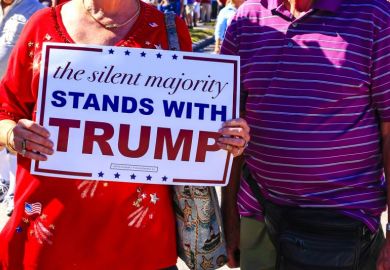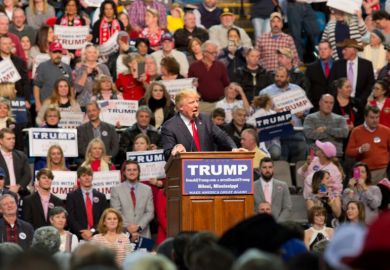In the week after President Trump’s executive order banning arrivals from the seven Muslim-majority countries, global audiences have watched heart-breaking scenes at US airports where thousands of people have been denied entry and turned back. Meanwhile, huge crowds across the world have demonstrated their support for Muslims, and public figures and institutions have condemned the bigotry of the new administration.
As a lecturer in religious studies with a particular interest in Islam, I think that it is important to reflect on the prospects for Islam-related academic subjects while Trump is in office. So I have asked my American colleagues about their views on this issue. I asked them: given the history of deep suspicion of Islam in the US that transformed into hysterical Islamophobia post-9/11, can it really get any worse?
Maria Curtis, associate professor of anthropology and cross-cultural studies and programme director at the University of Houston-Clear Lake, in Texas, is guardedly optimistic. “As far as I can tell, anytime there seems to be a political shift like this, it only seems to drive up student interest in Islam and Middle East courses,” she told me. “I am currently teaching a class called Islam in America, and I have 22 students enrolled. They are very engaged, sincere and interested students.
“They are hoping to really learn more about Islam’s roots in America and they are thrilled to know just how deep those roots are.”
This trend is confirmed by Charles Kurzman and Carl W. Ernst from the University of North Carolina at Chapel Hill who, in their 2012 paper Islamic Studies in U.S. Universities, noted a nationwide spike of interest in Islam in US academia since 2001. The numbers of dissertations and academic articles about Islam, and faculty members specialising in Islam, has grown exponentially, they find. This has been paralleled by an increased and sensationalised media focus on the Muslim community.
As the authors observe, somewhat resignedly: “this attention derives in large part from overblown fears of security threats. The field seems to benefit both from Muslims committing atrocities and also from the ignorance and paranoia of non-Muslims.”
Islam-related subjects face serious ideological opposition from some evangelical Christian organisations, who oppose the teaching of Islam that does not show it as a terrorist religion. In 2002, an organisation called the Family Policy Network (FPN) filed a suit against the University of North Carolina Chapel Hill to prevent an academic text about the Koran from being taught as part of a summer induction programme, citing an alleged breach of the First Amendment.
FPN also argued that the book presented an idealised view of Islam that did not explain the terrorist acts of 9/11, and therefore did not provide a suitable educational resource for American students. FPN lost the case, and several subsequent appeals, but in doing so highlighted a prominent narrative: that teaching Islam is only justifiable as part of the securitisation agenda. This idea unsettlingly dovetails with the Trump administration’s course of action.
As Kecia Ali, associate professor of religion at Boston University, says: “The administration’s [executive] order has far-reaching, chilling, potentially devastating effects on the study of Islam and Muslims.” She is joined by a chorus of voices from the American Academy of Religion (AAR) and religious and Islamic studies departments across America. The AAR’s statement of protest says that Trump’s ban “poisons the public’s understanding of Islam in particular and religion in general”, and is an “example of religious bigotry rooted in ignorance and as an attack on the American principle of religious liberty”.
Professor Curtis concludes that although we tend to blame a lot on Trump, Islam “has always challenged American pluralism”.
“It has been there as a benchmark of sorts, asking the question ‘what are the limits of American pluralism?’. And we find all sorts of examples and responses, some very forward-thinking and tolerant, and some quite ready to cast all ‘Mohammedans’ into the fire along with witches, criminals, pagans, and anyone else outside the realm of evangelical Protestants.”
Anna Piela is a lecturer in religious studies at Leeds Trinity University. Her research interests are focused on gender and Muslim identities in the West.
Register to continue
Why register?
- Registration is free and only takes a moment
- Once registered, you can read 3 articles a month
- Sign up for our newsletter
Subscribe
Or subscribe for unlimited access to:
- Unlimited access to news, views, insights & reviews
- Digital editions
- Digital access to THE’s university and college rankings analysis
Already registered or a current subscriber?







